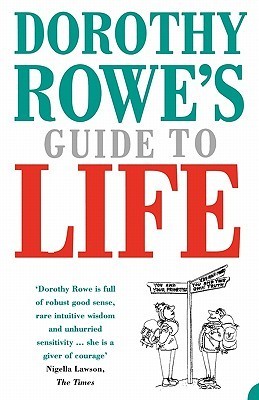Este es uno de los mejores libros de "autoayuda" que he leído, y llegó a mí de una forma insólita. Me gustaría contar esa anécdota antes de comentar un poco sobre su contenido.
Hace un par de meses, un domingo a la noche, volvía a casa angustiada, llorando. Caminaba por Av. Entre Ríos a la altura de Moreno, cuando vi una escena típica de Buenos Aires: un contenedor de basura al que habían sacado parte de su contenido, quedando sobre la calle, todo revuelto. Me sorprendió la gran cantidad de papeles, vislumbré libros, y tuve que acercarme a ver. "Vivir la vida" estaba de cara al cielo, un poco sucio pero el único todavía entero. Cuando leí el subtítulo en la tapa supe que tenía que llevármelo conmigo. Llegué a casa y lo limpié lo mejor que pude. Mientras lo hacía me encontré con que había sido leído antes con mucha atención, por la gran cantidad de marcas en lápiz, y que probablemente había sido importante y/o querido; entre sus páginas había hasta una foto en blanco y negro de una nena, "Ximena, 1 año", que no tuve corazón para mover del lugar en que estaba. Empecé a leerlo ese mismo día y me di cuenta de que era una lectura para dosificar y procesar, por su calidad y profundidad.
Como no pude resumir mucho la anécdota, voy a tratar de ser más concisa respecto al libro. Dorothy Rowe fue una psicóloga australiana que dedicó su vida a investigar la depresión. Por lo que pude leer en Internet, era una prolífica y respetada autora. Me llama la atención no haber sabido de su existencia antes, y después de esto necesito seguir leyéndola.
"Vivir la vida: cómo desvelar el secreto de la vida para ser feliz con uno mismo y con los demás", a primera vista un título pretencioso y marketinero, no hace justicia a la seriedad de su contenido. En él tiene un papel central el concepto de "estructura de significados" y cómo interpretamos la realidad, actuamos, nos relacionamos, etc. a partir de esa estructura, en cuya construcción son cruciales nuestras experiencias pasadas, y que se compone a su vez de dos subestructuras, cómo nos sentimos respecto a nosotrxs mismxs y cuál es nuestra máxima prioridad en la vida.
Con esta base, Rowe desarrolla una serie de capítulos titulados "Tú y..." que abordan, entre otros tópicos, la depresión, el tiempo, la muerte, las relaciones con otrxs, la comunicación, el poder... Todos son breves y jugosos, están escritos de forma bien clara y hasta acompañados de viñetas, que estéticamente no son de lo más atractivas, aunque es comprensible en una edición noventosa como la que leí (y que sean un poco feítas es lo de menos).
Cierro retomando la primera idea: definitivamente es uno de los mejores libros de este género que he leído y no entiendo por qué no se ve en librerías al mismo nivel que, por ejemplo, "Tus zonas érroneas" de Wayne Dyer. Rescato además que contiene unas cuantas reflexiones muy actuales sobre la desigualdad de género, el pacifismo y el cambio climático, algo para destacar en un libro de la época en que fue escrito.
Me dio pena, al terminarlo y buscar información sobre la autora, enterarme de que había fallecido en 2019. De todas maneras, lo que me hubiera gustado decirle ya se lo dijo otra lectora, como relata en la última página: "Me gustaría decirle qué pienso de sus libros. Cuando estoy sola, cojo uno de sus libros y me pongo a leer. Es como tener a un amigo con quien charlar". Gracias, Dorothy, y gracias a lo que sea que hizo que rescatara tu libro de la basura esa noche; también se convertirá para mí un buen compañero.

